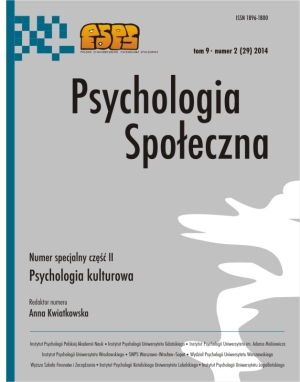Znaczenie kolektywizmu i indywidualizmu dla zachowań rodzicielskich matek
Cultural fi t hypothesis: The impact of individualism-collectivism on maternal parenting...
Author(s): Katarzyna LubiewskaSubject(s): Psychology
Published by: Wydawnictwo Naukowe Scholar Sp. z o.o.
Keywords: attachment; collectivism–individualism; cultural fi t hypothesis
Summary/Abstract: The study investigated “cultural fi t hypothesis” (CFH) focusing on attachment formation in families in Poland and Germany. The fi t between normative country-culture, and the infl uence pattern of maternal individual-level collectivism-individualism and parenting on teen-offspring generic attachment, were analyzed in the study. Treating Germany as an individualistic culture, individual-level individualism of mothers was hypothesized to infl uence their parenting and teen attachment. Due to social change in Poland the same effect of collectivism was expected. Attachment avoidance was hypothesized to be more sensitive to culture-infl uence than anxiety. A total of N = 569 families (mothers, and their adolescent children) were interviewed in Poland, and N = 305 families in Germany. Attachment representation was assessed by AAS (Collins & Read, 1990), values by shortened scale of Schwartz & Bilsky (1990), and parenting by PARQ (Rohner et al., 1980) in shortened version. Multigroup SEM was implemented to test the hypothesis. Results confi rmed hypotheses and evidenced CFH. Namely, the infl uence of maternal collectivism on her parenting was found in Poland, while the same although trend level infl uence of individualism in Germany. Individualism was found to infl uence directly teen attachment-avoidance in Germany. The results evidence that parental values normative for different cultures stimulate positive attachment security outcomes.
Journal: Psychologia Społeczna
- Issue Year: IX/2014
- Issue No: 29
- Page Range: 200-219
- Page Count: 20

